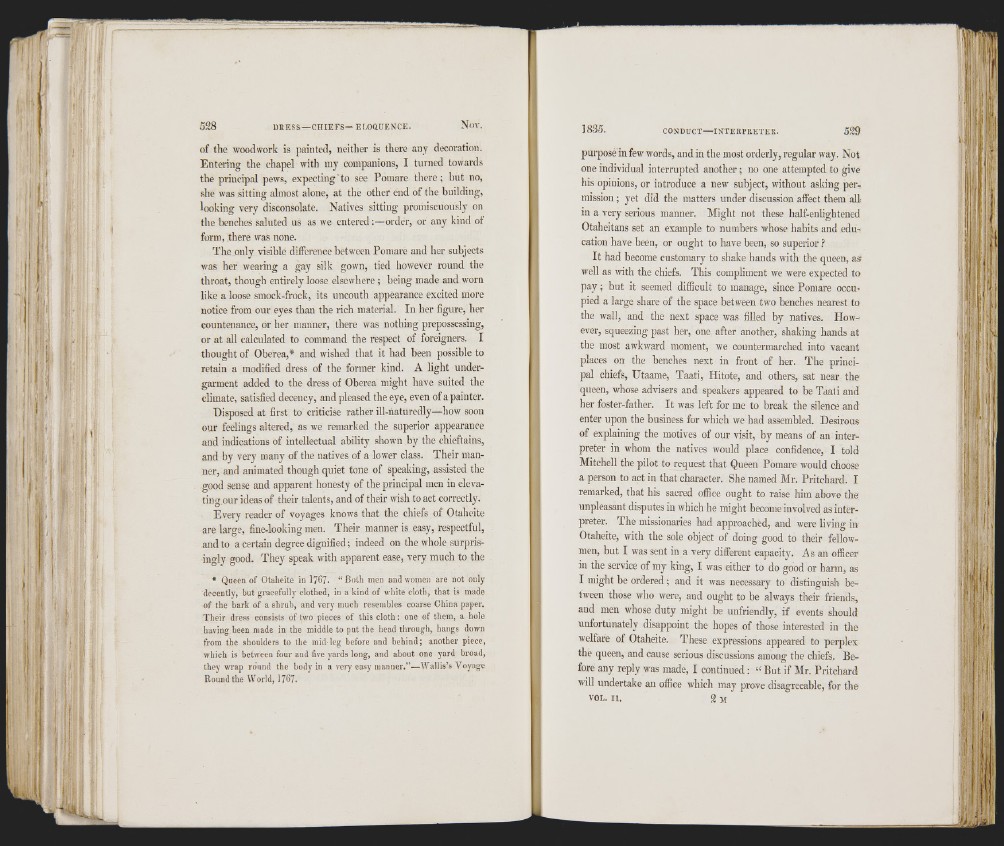
j
.
i: : f i
L i
V i
fi',’
rid
'
I; ■ "
p r
T'' I fI , '
:i ■ 'I S
!r I f
L
528 URESS— CHIEFS— ELOQUENCE.
of the woodwork is painted, neither is there any decoration.
Entering the chapel with my companions, I turned towards
the principal pews, expecting to see Pomare tliere; but no,
she was sitting almost alone, at the other end of the building,
looking very disconsolate. Natives sitting promiscuously on
the benches saluted us as we entered:—order, or any kind of
form, there was none.
The only visible difference between Pomare and ber subjects
was her wearing a gay silk gown, tied liowever round the
throat, though entirely loose elsewhere ; being made and worn
like a loose smock-frock, its uncouth appearance excited more
notice from our eyes than the rich material. In her figure, ber
countenance, or her manner, there was nothing prepossessing,
or at all calculated to command the respect of foreigners. I
thought of Oberea,* and wished that it had been possible to
retain a modified dress of the former kind. A light undergarment
added to the dress of Oberea might have suited the
climate, satisfied decency, and pleased the eye, even of a painter.
Disposed at first to criticise rather ill-naturedly—how soon
our feelings altered, as we remarked the superior appearance
and indications of intellectual ability shown by the chieftains,
and by very many of the natives of a lower class. Their manner,
and animated though quiet tone of speaking, assisted the
good sense and apparent honesty of the principal men in elevating
our ideas of their talents, and of their wash to act correctly.
Every reader of voyages knows that the chiefs of Otaheite
are large, fine-looking men. Their manner is easy, respectful,
and to a certain degree dignified; indeed on the whole surprisingly
good. They speak with apparent ease, very much to the
* Queen of Otaheite in 1767* “ Both men and women are not only
decently, but gracefully clothed, in a kind of white cloth, that is made
of the bark of a shrub, and very much resembles coarse China paper.
Their dress consists of two pieces of this cloth: one of them, a hole
having heen made in the middle to put the head through, hangs down
from the shoulders to the mid-leg before and behind; another piece,
which is between four and five yards long, and about one yard broad,
they wrap round the body in a very easy manner.”—Wallis’s Voyage
Round the World, 1767.
purpose in few words, and in the most orderly, regular way. Not
one individual interrupted another; no one attempted to give
his opinions, or introduce a new subject, without asking permission
; yet did the matters under discussion affect them all
in a very serious manner. Might not these half-enhghtened
Otaheitans set an example to numbers whose habits and education
have been, or ought to have been, so superior ?
It had become customary to shake hands with the queen, as
well as with the chiefs. This compliment we were expected to
pay; but it seemed difficult to manage, since Pomare occupied
a large share of the space between two benches nearest to
the wall, and the next space was filled by natives. However,
squeezing past her, one after another, shaking hands at
the most awkward moment, we countermarched into vacant
places on the benches next in front of her. The principal
chiefs, Utaame, Taati, Hitóte, and others, sat near the
queen, whose advisers and speakers appeared to be Taati and
her foster-father. It was left for me to break the silence and
enter upon the business for which we had assembled. Desirous
of explaining the motives of our visit, by means of an interpreter
in whom the natives would place confidence, I told
Mitchell the pilot to request that Queen Pomare would choose
a person to act in that character. She named Mr. Pritchard. I
remarked, that his sacred office ought to raise him above the
unpleasant disputes in which he might become involved as interpreter.
The missionaries had approached, and were living in
Otaheite, with the sole object of doing good to their fellow-
men, but I was sent in a very different capacity. As an officer
in the service of my king, I was either to do good or harm, as
I might be ordered; and it was necessary to distinguish between
those wlio were, and ought to be always their friends,
and men whose duty might be unfriendly, if events should
unfortunately disappoint the hopes of those interested in the
welfare of Otaheite. These expressions appeared to perplex
the queen, and cause serious discussions among the chiefs. Before
any reply was made, I continued ; “ But if Mr. Pritchard
will undertake an office which may prove disagreeable, for the
VOL. 11. 2 m